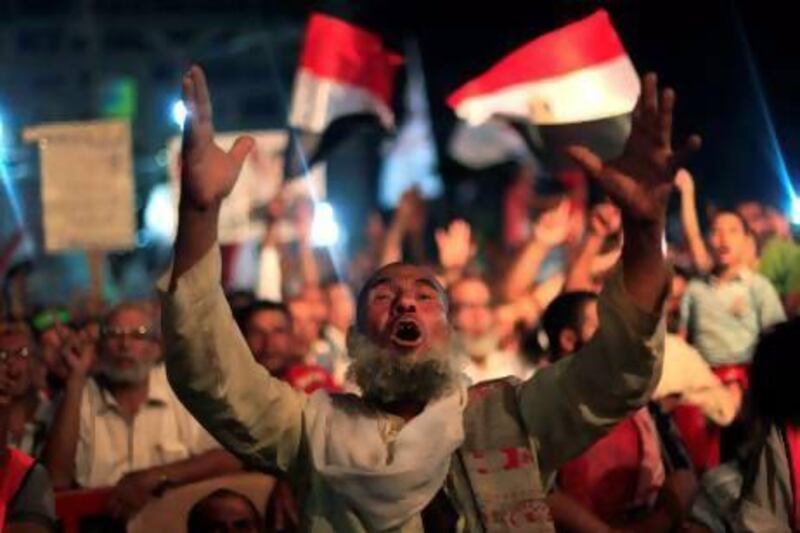CAIRO // Amid a flurry of visits by American and other foreign envoys, Egypt's interim presidency yesterday denounced "foreign pressure" in a sign of its growing impatience with international efforts to resolve its political crisis.
Yesterday, two prominent United States senators called on the government to release Islamist prisoners and start talks to end a stand-off with supporters of the deposed president, Mohammed Morsi.
"Democracy is the only viable path to stability," said the US senator and former US presidential candidate, John McCain. He called for "an inclusive political process in which all Egyptians are free to participate."
Senator McCain and Senator Lindsey Graham, sent to Cairo at the request of the US president, Barack Obama, had earlier met with the army chief, General Abdel Fattah El Sissi, and other interim leaders.
US and other international officials have urged the inclusion of Mr Morsi's Muslim Brotherhood in the political process.
But the military-backed administration has held firm to a political road map announced the day Mr Morsi was removed by the military after mass protests that called on him to step down.
Top Egyptian officials said reconciliation was a priority but only after the Brotherhood renounced violence.
Ahmed El Musalamani, a spokesman for interim president Adly Mansour, said that "foreign pressure has exceeded international standards". He said that Egypt would protect "the revolution" in a reference to June 30, the day hundreds of thousands of Egyptians revolted against Mr Morsi's rule.
Egypt's official news agency Mena reported that the two US senators and Gen El Sissi discussed efforts to end "the state of political polarisation and stop the violence" while moving forward with Egypt's fast-track road map, which aims to amend the constitution and hold new parliamentary and presidential elections by early next year "without discrimination or isolation".
The UAE Foreign Minister, Sheikh Abdullah bin Zayed Al Nahyan, also in Cairo, held meetings yesterday with the leaders of several Egyptian political parties as well as Amr Moussa, the former Secretary-General of the Arab League.
Sheikh Abdullah "emphasised the importance of supporting the road map and of working with the transitional government" in his conversations with the political leaders, according to a statement reported by Wam.
International mediators are hoping to avert a collision between the military-backed government and Muslim Brotherhood supporters who have been camping out in two main sit-ins in Cairo and its sister city of Giza for more than a month demanding Mr Morsi's reinstatement as well as the return of the constitution and the parliament.
The protest camps have been used as a catalyst for marches that blocked traffic and sometimes sparked street violence either with security forces, or Mr Morsi's opponents.
In two incidents this month, more than 130 mostly Morsi-supporters were killed in clashes near their main sit-in in eastern Cairo.
The government said that it had ordered the security forces to clear out the two protest camps because they pose a "national security threat".
The Muslim Brotherhood publicly said it rejected any concessions and its starting point would be with Mr Morsi's return to power.
Privately, however, protesters at sit-in have said that the camp was their last bargaining chip, to press for the release of detained leaders and, more importantly, to get guarantees that they would be included in political life.
A European Union official in Brussels had said that diplomats were working on confidence-building measures, such as releasing detained Brotherhood officials, dropping charges against other group members and dispersing the pro-Morsi sit-ins.
The interim vice president, Mohammed ElBaradei, yesterday said that Egypt's "priorities are to secure citizens and protect their lives, their possessions and to preserve security and law while moving forward to achieve comprehensive political reconciliation".
* Associated Press with additional reporting from Reuters





